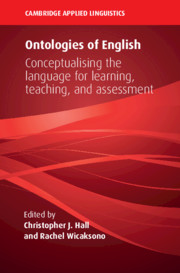Book contents
- Ontologies of English
- The Cambridge Applied Linguistics Series
- Ontologies of English
- Copyright page
- Dedication
- Contents
- Figures
- Tables
- Contributors
- Series Editors’ Preface
- Acknowledgements
- Transcription Conventions
- Part I Introduction
- Part II English in/for L2 Learning and Teaching
- Part III English in Schools
- Part IV Assessing English
- Part V English in Lingua Franca Contexts
- 12 What Is English in the Light of Lingua Franca Usage?
- 13 English as a Lingua Franca and Transcultural Communication
- 14 Exploring Standards-Based, Intelligibility-Based, and Complex Conceptions of English in a Lingua Franca Context
- Part VI English and Social Practice
- Part VII Commentary and Conclusions
- Index
- References
14 - Exploring Standards-Based, Intelligibility-Based, and Complex Conceptions of English in a Lingua Franca Context
from Part V - English in Lingua Franca Contexts
Published online by Cambridge University Press: 24 December 2019
- Ontologies of English
- The Cambridge Applied Linguistics Series
- Ontologies of English
- Copyright page
- Dedication
- Contents
- Figures
- Tables
- Contributors
- Series Editors’ Preface
- Acknowledgements
- Transcription Conventions
- Part I Introduction
- Part II English in/for L2 Learning and Teaching
- Part III English in Schools
- Part IV Assessing English
- Part V English in Lingua Franca Contexts
- 12 What Is English in the Light of Lingua Franca Usage?
- 13 English as a Lingua Franca and Transcultural Communication
- 14 Exploring Standards-Based, Intelligibility-Based, and Complex Conceptions of English in a Lingua Franca Context
- Part VI English and Social Practice
- Part VII Commentary and Conclusions
- Index
- References
Summary
This chapter aims to engage with wider discussions in this volume regarding ontologies of English and how language can be productively conceptualized by English teachers, learners/users, and other stakeholders. As indicated by the title, the work is intended to make a specific contribution towards uncovering complexity in ontologies of language that do not map cleanly onto dichotomies such as ‘monolithic versus plurilithic’ (Hall, 2013), ‘difference versus deficit’, or ‘standards-based versus intelligibility-based’. As also indicated, these ontological discussions are framed by a study carried out in a lingua franca context of pedagogy and usage, where (1) Japanese voluntary workers use English as a Lingua Franca to communicate with local interlocutors in diverse global locations and (2) an English language course is taken by these volunteers prior to their departure from Japan that is specifically designed to facilitate that communication. Further details on this context are provided in the following section before the focus returns to conceptions of English.
Keywords
- Type
- Chapter
- Information
- Ontologies of EnglishConceptualising the Language for Learning, Teaching, and Assessment, pp. 273 - 292Publisher: Cambridge University PressPrint publication year: 2020

